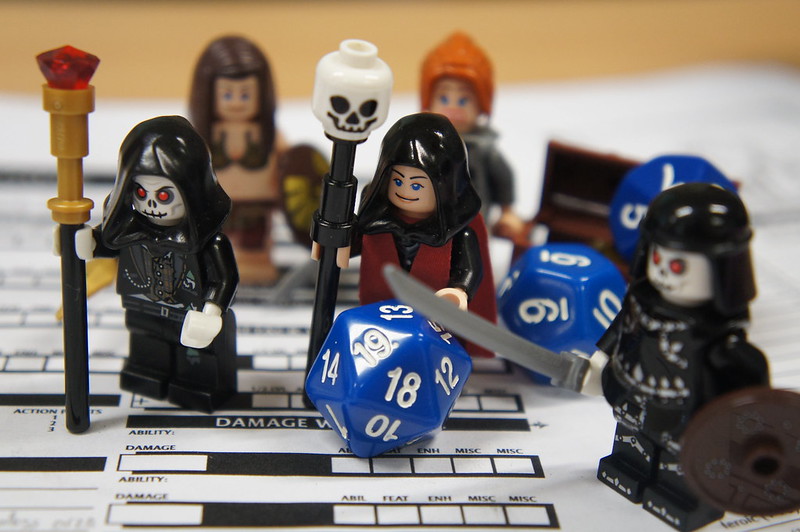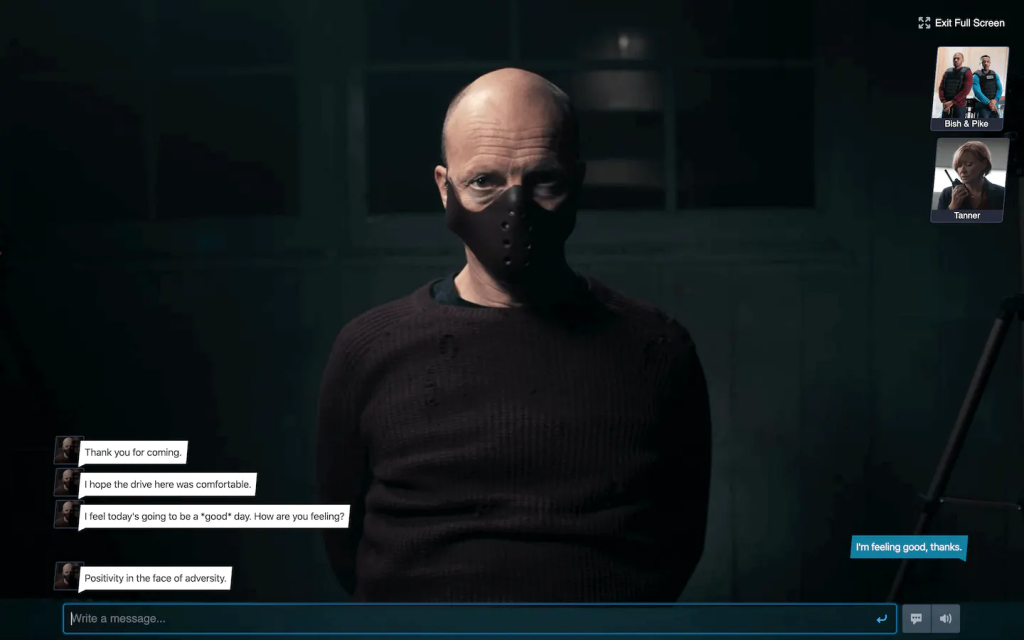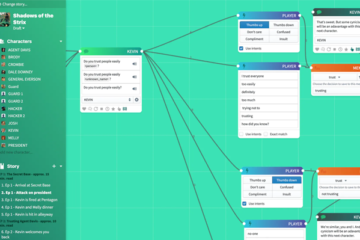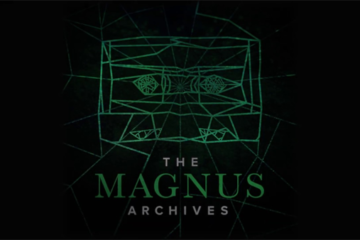Charisma.ai helps you create interactive stories, believable characters, and teaches you how to work with non-linear storytelling. An introduction about this cutting-edge company, before meeting its CEO, Guy Gadney.
A few days ago I was reading a post on Tumblr about the never-dead-always-trending-at-some-point fandom of Supernatural. In this post a fan was wondering how such a flawed show was able to hold the attention of such a large group of people for years and years. This despite the fact that nothing ever went the way fans wanted and the quality of the show has been (slowly?) declining for years.
I found the post – written by a newbie, someone who only started watching Supernatural 6 months ago – very enlightening. In particular:
“The fact that the show needs to be fixed is an essential part of its appeal: Strangely, if this show were better, it wouldn’t be as popular. If you love a show that is perfect, you watch it once or twice or thrice, make a bunch of memes, and move on with your life two years later when you find something else to hyper-fixate on. If you love a show that’s broken, you spend the rest of your life obsessed with fixing it […] Supernatural fans are not fans of the actual show, but of the show they imagine it could be, one that only exists in an alternate universe“
Having been a fan of Supernatural for the past 14 years, I can say that yes, this is absolutely accurate and is exactly why so many of us have continued to devote our time to something that never went in the direction it was supposed to go but kept promising us that it would.
Even after the miserable end we still haven’t gotten over with, people kept writing stories about this show to imagine different versions. They continued to discuss how things should have gone. They made videos changing the original scenes. They even encouraged petitions to reshoot the final episode. We discussed all this in an article of our recent project, Fanside – a fanzine by fans for fans.
The reasons are pretty obvious and always the same when it comes to fans: we’re so invested in the story and the characters that we feel their world is a bit ours. We own it and want to be a part of it, sometimes just as a Deus Ex Machina who could write a better ending. And that goes for any show we’ve fallen in love with and any movie we’ve become passionate about.
Owning the narrative: the work in storytelling of Charisma.ai
Bringing the audience inside the narrative, letting them choose and direct the story (or at least give them the impression that’s what they’re doing) is the basis of the success of several media productions we all know: Dungeons & Dragons and RPG, online multiplayer games, Choose your Own Adventure books, XR productions in general (mentioning Alien Rescue because of reasons), videogames like Detroit: Become Human.

Among them is a company I only recently discovered that has made interactive storytelling its main goal and mission, taking it to “extremes” using the most advanced technological tools available.
Charisma.ai is a British company founded by Annette Parry, Ben Salili-James and Guy Gadney. Not only do they offer interactive stories through their app that you can participate in as a character. They also give you the ability to create your own interactive stories, which give your audience the possibility to choose where they want to go with it. An accessible tool, whether you’re just someone who wants to read a story or a writer/fanwriter who wants to experiment with the source material or create something original.
Charisma.ai is described, in the official website, as an “easy, no-code way to create interactive stories with believable virtual characters that respond to what you say“, which allows us to identify three main elements that characterize their approach to storytelling. The first is their use of technological tools to create stories.
AI and accessible technological tools
But don’t panic, there, writers and artists. Because Charisma.ai moves from the idea that there are more productive challenges that AI can be used for rather than putting the creative industries out of business. So while they work with artificial intelligence and are indeed a cutting-edge company, they also recently launched the Collaborative AI Consortium:
“At Charisma.ai, we believe that AI is a new toolkit for artists, writers and musicians. It can be used to inspire, accelerate, experiment and collaborate with, not to replace. To that end, we are proud today to announce the launch of a new group to increase the presence of the Creative Industries in the development of AI” (x)
This approach has allowed them to create innovative and engaging experiences for audiences (like the interactive TV series “Bulletproof”, launched with Sky and that can be played here) but at the same has pushed them to offer artists easy and accessible ways to craft their own narratives. The narrative maps that you can build by registering to their website may seem complex at first but are actually a clear way to visualize your story and the branches it opens up to.

The importance of engaging characters
Charisma.ai recognizes well-written characters as an essential element of good storytelling: “The premise that characters are central to a good story is age-old. Despite all the new technology, our experience with this is no different. We have found that interactive stories that are character-led engage audiences because they offer a unique experience” (x)
A recent example of their focus on characters writing can be found in their recent connection with Epic Games’ MetaHuman. MetaHuman Creator is a cloud-based app for creating photorealistic digital humans, fully rigged and complete with hair and clothing, which Epic Games recently opened up to their users in their Early Access program.

But good characters aren’t just believable-looking characters. You can have physically unrealistic characters and still accept them as real and find yourself immersed in their story. As Charisma.ai points out in their most recent blog post, “[…] while these Metahumans may look more real, there are many more elements that need to be added for them to feel real“.
And that’s where Charisma.ai comes to the rescue, offering the possibility to create a story around these realistic-looking characters and to put yourself inside that story: you can set up dialogue, expressions and emotions, add notions about who you are and what you’re going to do, all of this simply by using dynamic text and speech. The characters will respond to it and change their interactions with you based on what you have taught them.

Where this thing might go, well, that’s something only the bravest and most devoted fans know in their hearts (and yes, in my mind it also involves rewriting very bad scenes we’ve all had to endure in our products of interest).
Knowing your characters and knowing your audience
If you’ve ever written a story, you’re probably aware of one of the most important things you need to do if you want to write something that’s believable and effective: you need to know your characters. Where they come from, how they think, how they would react in the most diverse situations.
In fanfiction, this means that you need to understand the characters in the original work that inspired your story very well. In fact, one of the most relevant tags used in fanwriting is “IC,” in character, or “OOC,” out of character, depending on how well the characters you’re describing behave as they would in the original media source.
For this reason, one of the most interesting features that Charisma.ai offers is the narrative map. This is a tool that allows you to think about your characters and their behaviors and asks you to imagine how they might respond to different situations, both emotionally and verbally. Then, you have to write these possibilities on the map: they are activated in response to what your audience chooses to do.
For this reason, the map also becomes a tool that asks you to really look at your audience and understand their desires and what they might want from your story, so to open up the scenarios they would like to find.
It’s a brilliant example of non-linear storytelling that is interesting, more realistic and yet satisfyingly complex, but also a way to practice your writing skills and learn a new way to approach your stories.
Getting to know interactive storytelling: an interview with Charisma.AI CEO, Guy Gadney
A couple of months ago I joined HOPE! Creative Forum by Play On! | New Storytelling with Immersive Technologies. That’s when I met Charisma.ai and its CEO Guy Gadney. I was so excited about what they were working on that I immediately downloaded their interactive comics app (and OBVIOUSLY started with the Sherlock Holmes one) and soon after contacted Guy to ask for an interview about storytelling and AI, topics he was very happy to help us discover.

